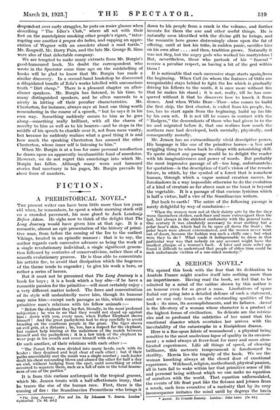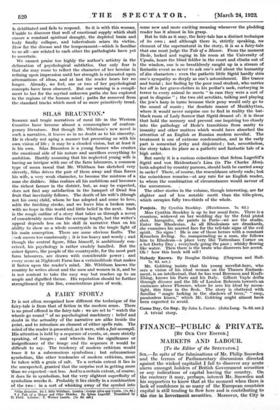A SERIOUS NOVEL.*
WE opened this book with the fear that its dedication to Anatole France might resolve itself into nothing more than an impertinence. Having read the book, we feel that to be admired by a mind of the calibre shown by this author is an honour even for so great a man. Limitations of space forbid our going into a detailed defence of such a statement, and we can only touch on the outstanding qualities of the book : its aims, its accomplishments, and its failures. Ascent is the life-story of a woman whose character is a product of the highest forms of civilization. So delicate are the intrica- cies and so profound the subtleties of her mind that the emotional disaster which overtakes her arrives with the inevitability of the catastrophe in a Euripidean drama. Here is a fine-spun fabric of womanhood ; a physical being sensitive to the most unobvious lapse of quality in its environ- ment ; a mind always at fever-heat for rarer and more alem- bleated experiences. Lilee all things of speed, of cleaving brilliance, this meteoric temperament is foredoomed to sterility. Herein lies the tragedy of the book. We see the woman knocking always at the closed door of emotional experience. Wifehood, religion, motherhood, physical passion, all in turn fail to wake within her that primitive sense of life and personal being without which we can make no equation of ourselves with the world. That equation unformtdated, the events of life float past like the flotsam and jetsam from a wreck, each item evocative of a curiosity that by its very inconsequence irritates the mind until by degrees the brain • Ascent. BY Francis Ramsey. London : John Lane. 17s. 6c1.1
Is debilitated and fails to respond. So it is with this woman. Unable to discover that well of emotional supply which shall ensure a constant spiritual draught, the depleted brain and body finally collapse, and tubeiculosis seizes its victim. How far the disease and the temperament—which is familiar to us all—are related to each other the pathologists have yet to ascertain.
We cannot praise too highly the author's artistry in the delineation of psychological subtleties. Our only fear is that she may come to reflect the character of her heroine in refining upon impression until her strength is exhausted upon attenuations of ideas, and at last the reader hears her no longer. Already, we feel, one or two of her psychological concepts have been obscured. But our warning is a compli- ment to her for the myriad unknown paths she has explored in the regions of the human mind ; paths far removed from the standard tracks which most of us more primitively tread.



































































 Previous page
Previous page